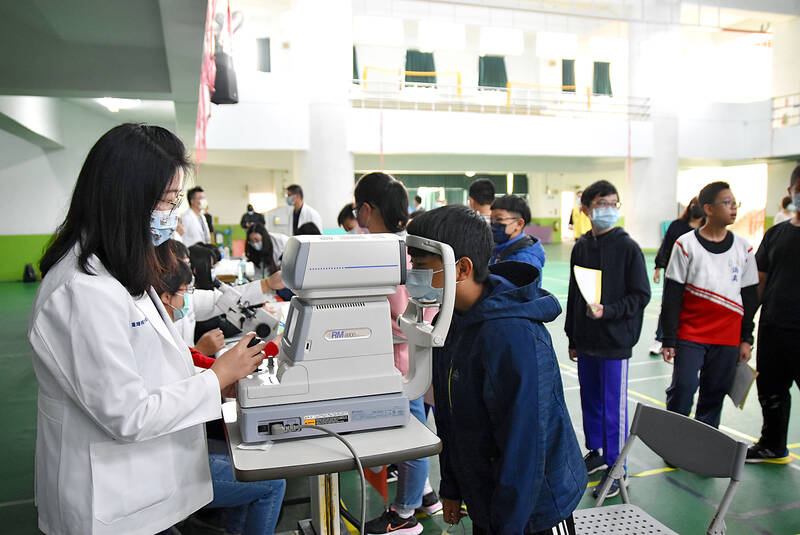Ophthalmologists are to conduct general screenings at kindergartens to check children’s vision as part of a pilot program by the Ministry of Health and Welfare for the current academic semester.
Studies have found that 30 percent of the worldwide population have some form of myopia, or nearsightedness.
However, the condition is far more prevalent in Taiwan, as more than 70 percent of sixth graders have myopia, the Health Promotion Administration said on Sept. 19.

Photo: Huang Shu-li, Taipei Times
To reduce cases of severe myopia, the agency said it is to introduce a pilot program for ophthalmologists to visit kindergartens for screenings.
“People should not just deal with myopia by wearing prescription glasses,” Health Promotion Administration Director-General Shen Ching-fen (沈靜芬) told a news conference at the ministry in Taipei.
“When children have myopia, it will gradually get worse each year if nothing is done about it. There is also a high likelihood that it would lead to cataracts, glaucoma, macular degeneration and even retinal detachment, and also an increased likelihood of blindness,” Shen said.
“A survey found that 9 percent of older kindergarten students [five to six years old] have myopia. In the first year of elementary school that jumps to 19.8 percent and rises to 70.6 percent by sixth grade. In the final year of senior high school, 87.2 percent of students are nearsighted. That is a far higher figure than the worldwide average,” she said.
Previously, teachers would do an examination by checking students’ vision using an eye chart, HPA Maternal and Child Health Division senior specialist Hu Yi-chun (胡怡君) said.
National Taiwan University (NTU) Hospital ophthalmologist Hou Chun-ho (侯鈞賀) discussed his experience of treating a child known as “Little Hao” (小皓).
Aged five, Little Hao had fairly good vision at 1.0 diopter, Hou said.
“But both of his parents have medium to high myopia at between 300 [minus-3.0 diopter] to 500 [minus-5.0 diopter] degrees,” he said. “So his parents took him for an eye examination at a clinic, which found Little Hao had farsightedness at plus-125 degrees [1.25 diopter], so he had some room to compensate for likely future development of myopia.”
When Little Hao reached second grade, regular examinations found that he had fallen to plus-75 degrees [0.75 diopter], meaning his eye axial length was growing and he had a higher risk of developing myopia, he added.
“After discussion with parents, they agreed for him to start taking the eye medication Atropine to stall the onset of myopia. Now he is in third grade and his vision has held stable at plus-25 degrees [0.25 diopter]. He had not developed myopia and had no need to wear corrective lenses,” Hou said.
As some parents worry that their child might not be comfortable when undergoing eye examination, NTU Children’s Hospital ophthalmologist Tsai Tzu-hsun (蔡紫薰) offered three simple instructions.
The first is “don’t worry,” as teams from clinics are professional ophthalmologists who administer eyesight examination using safe and reliable methods, Tsai said.
The second is to teach their child to cooperate with the ophthalmologist’s instructions, she said.
The third is to give their child a broad-brimmed hat and sunglasses, to prevent the eyes becoming too sensitive, which could also lead to damage, she added.

The Taipei Mass Rapid Transit (MRT) Wanda-Zhonghe Line is 81.7 percent complete, with public opening targeted for the end of 2027, New Taipei City Mayor Hou You-yi (侯友宜) said today. Surrounding roads are to be open to the public by the end of next year, Hou said during an inspection of construction progress. The 9.5km line, featuring nine underground stations and one depot, is expected to connect Chiang Kai-shek Memorial Hall Station to Chukuang Station in New Taipei City’s Jhonghe District (中和). All 18 tunnels for the line are complete, while the main structures of the stations and depot are mostly finished, he

Taipei is to implement widespread road closures around Taipei 101 on Friday to make way for large crowds during the Double Ten National Day celebration, the Taipei Department of Transportation said. A four-minute fireworks display is to be launched from the skyscraper, along with a performance by 500 drones flying in formation above the nearby Nanshan A21 site, starting at 10pm. Vehicle restrictions would occur in phases, they said. From 5pm to 9pm, inner lanes of Songshou Road between Taipei City Hall and Taipei 101 are to be closed, with only the outer lanes remaining open. Between 9pm and 9:40pm, the section is

The first global hotel Keys Selection by the Michelin Guide includes four hotels in Taiwan, Michelin announced yesterday. All four received the “Michelin One Key,” indicating guests are to experience a “very special stay” at any of the locations as the establishments are “a true gem with personality. Service always goes the extra mile, and the hotel provides much more than others in its price range.” Of the four hotels, three are located in Taipei and one in Taichung. In Taipei, the One Key accolades were awarded to the Capella Taipei, Kimpton Da An Taipei and Mandarin Oriental Taipei. Capella Taipei was described by

The Taipei Economic and Cultural Office in Vancouver, Canada, on Saturday hosted a reception to celebrate Double Ten National Day. Conservative Canadian lawmaker Marc Dalton called Taiwan a “beacon of courage and resilience in the face of rising authoritarianism,” according to a post on the Taiwan in Vancouver Facebook page. Also in attendance were fellow conservative caucus members Tako Van Popta and Chak Au, who said that Taiwan plays an “indispensable role” in ensuring global peace, prosperity and stability due to its strategic position in the Indo-Pacific region, it said. Canadian lawmaker Michael Cooper also recorded a message wishing Taiwan a